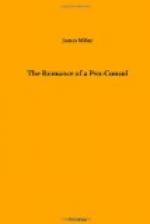’You have to remember that the movement for throwing over the Colonies, was rising as an force active in England. They had come into being almost unbidden; they were regarded with a cold interest. The notion that it would be a good thing to lop them off altogether, was being accepted among English statesmen. You could feel the heresy in the air—gusts that brushed your face like a chill.’
The South Africa thus put foot upon by Sir George Grey, was re-created to him long after, in a cablegram that he received in New Zealand. The South African railway system, which he tended in its infancy, had crawled north to Bloemfontein, as it has since gone farther, and still goes on, the iron-shod tramp. That auspicious day, Bloemfontein remembered the author of its Grey College, and gripped his hand across the sea. It made him very happy. Providence had set him to garden three countries of the Southern Hemisphere in rapid succession. That ‘God bless you’ from Bloemfontein, showed, perhaps, that he had not tilled in vain.
‘There can be no harm,’ said Sir George, ’in relating another incident, which kept up the kindly link between the Orange Free State and myself. Before my friend Mr. Reitz accepted its Presidency, he wrote and asked me would I be willing to consider the offer, provided it were made to me? I was then, I think, in the quiet of Kawau Island, and I suppose Mr. Reitz believed I might be more actively employed.
’One did not need to be already a burgher of the Free State, for President Brand had not been; at all events, that was not an obstacle. I did not see my way to regard the offer, but the making of it manifested a beautiful trait in Mr. Reitz’s character. How many men, being tendered the highest post that their country could confer, would have turned to another, asking, “Will you accept it?"’
The manner in which Sir George tackled the South African embroilment, appears in his treatment of that mongrel race, the Hottentots. They recruited largely to the Queen’s Colonial service, but had a grievance in that, on leaving, they did not get, as they had been led to expect, the pension of white troopers. The ‘Totties,’ so christened in the Colony, might be loyal and brave, but they were not whites, and anything was good enough for them, if only it meant an Imperial saving. The Governor determined, ’This must be wiped out; its effect has already been disastrous; the Queen’s uniform has but one colour.’ He applied to Downing Street, only to be informed that it was not possible to reward native troopers, on retirement, as whites were. This did not content him.
’I went to the Cape Parliament, which, recognising the simple justice of my proposal, adopted it with a wise liberality. There was immediate satisfaction among the Hottentots, and on no subsequent occasion did they give trouble. It was ever my endeavour to bind the natives to us by esteem, to convince them that British rule was the most desireable rule they could have.’




